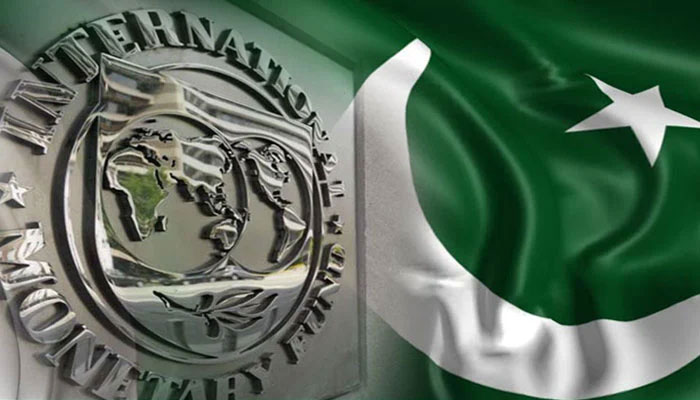Electronic asset declaration system: IMF to be given asset details of high-level public office-holders
The government has given a written commitment to the IMF for establishing an electronic asset declaration system to disclose details of assets possessed by high-level public office holders
ISLAMABAD: The government has given a written commitment to the IMF for establishing an electronic asset declaration system to disclose details of assets possessed by high-level public office holders, including cabinet members, parliamentarians and bureaucrats.
In the sent-out signed Letter of Intent (LoI) to the IMF’s Executive Board, the government has given an undertaking for continuation of Structural Benchmark (SB) for establishing a task force with inputs from international experts and civil society organisations to strengthen the institutional framework for an anti-corruption drive.
Pakistan and the IMF had agreed on the completion of the 6th Review under the PTI-led government that the government would take measures for strengthening the effectiveness of anti-corruption institutions.
Priority measures include the establishment of an asset declaration system with focus on high-level public officials (including federal cabinet members) by end-January 2022 (end-June 2021 SB, reset to end-January 2022), but it could not be implemented. It was also agreed for publication of the second review cycle report under the UN Convention against Corruption, and a review of the institutional framework for Pakistan’s anti-corruption institutions by independent experts with international experience.
The measures to strengthen governance and control of corruption remain crucial. Pakistani authorities committed with the IMF that their priorities include strengthening the effectiveness of anti-corruption institutions.
To further advance transparency, accountability and integrity in the public sector, Pakistan will issue regulations to establish an electronic asset declaration system (end-June 2021 SB, reset to end-January 2022) that is comprehensive (i.e. covering assets beneficially owned or located abroad), centrally-held with the Federal Board of Revenue, covering federal civil servants of Basic Pay Scale 17 to 22, accessible to entities authorized by law (including banks for the limited purposes of conducting customer due diligence as required for the provision of banking services) and effectively verified.
It will also institutionalise public access for annual declarations for all members (elected and un-elected) of the federal government cabinet of Pakistan. “We are undertaking the 2nd review cycle under the UNCAC implementation mechanism, and will publish the full report, including the findings, analysis and recommendations for improving the anti-corruption framework,” it said. A task force with inputs from reputable international experts and civil society organisations will complete a review of the institutional framework of anti-corruption institutions by end-December 2021 to enhance their independence and effectiveness in investigating and prosecuting corruption cases, with proposals for legislative amendments as appropriate, it added. However, the government could not deliver on the commitments and now the IMF wants to include it as a part of prior actions for the revival of its programme.
-
 Can AI Bully Humans? Bot Publicly Criticises Engineer After Code Rejection
Can AI Bully Humans? Bot Publicly Criticises Engineer After Code Rejection -
 Search For Savannah Guthrie’s Abducted Mom Enters Unthinkable Phase
Search For Savannah Guthrie’s Abducted Mom Enters Unthinkable Phase -
 Imagine Dragons Star, Dan Reynolds Recalls 'frustrating' Diagnosis
Imagine Dragons Star, Dan Reynolds Recalls 'frustrating' Diagnosis -
 Steve Jobs Once Called Google Over Single Shade Of Yellow: Here’s Why
Steve Jobs Once Called Google Over Single Shade Of Yellow: Here’s Why -
 Barack Obama Addresses UFO Mystery: Aliens Are ‘real’ But Debunks Area 51 Conspiracy Theories
Barack Obama Addresses UFO Mystery: Aliens Are ‘real’ But Debunks Area 51 Conspiracy Theories -
 Selma Blair Explains Why Multiple Sclerosis 'isn't So Scary'
Selma Blair Explains Why Multiple Sclerosis 'isn't So Scary' -
 Will Smith Surprises Wife Jada Pinkett With Unusual Gift On Valentine's Day
Will Smith Surprises Wife Jada Pinkett With Unusual Gift On Valentine's Day -
 Shamed Andrew Has Paid Royal Favours With ‘national Scandal’
Shamed Andrew Has Paid Royal Favours With ‘national Scandal’ -
 Prince William Ticked Off By How Andrew ‘behaved With Staff’
Prince William Ticked Off By How Andrew ‘behaved With Staff’ -
 Prince William Questions Himself ‘what’s The Point’ After Saudi Trip
Prince William Questions Himself ‘what’s The Point’ After Saudi Trip -
 James Van Der Beek's Friends Helped Fund Ranch Purchase Before His Death At 48
James Van Der Beek's Friends Helped Fund Ranch Purchase Before His Death At 48 -
 King Charles ‘very Much’ Wants Andrew To Testify At US Congress
King Charles ‘very Much’ Wants Andrew To Testify At US Congress -
 Rosie O’Donnell Secretly Returned To US To Test Safety
Rosie O’Donnell Secretly Returned To US To Test Safety -
 Meghan Markle, Prince Harry Spotted On Date Night On Valentine’s Day
Meghan Markle, Prince Harry Spotted On Date Night On Valentine’s Day -
 King Charles Butler Spills Valentine’s Day Dinner Blunders
King Charles Butler Spills Valentine’s Day Dinner Blunders -
 Brooklyn Beckham Hits Back At Gordon Ramsay With Subtle Move Over Remark On His Personal Life
Brooklyn Beckham Hits Back At Gordon Ramsay With Subtle Move Over Remark On His Personal Life




